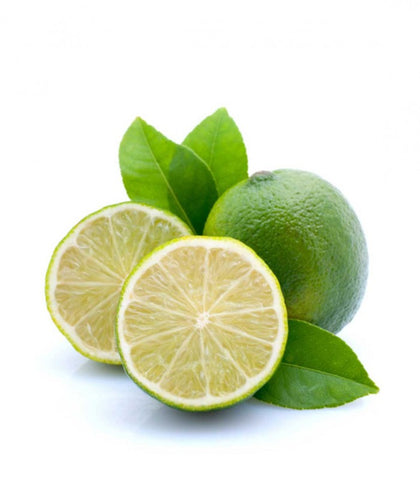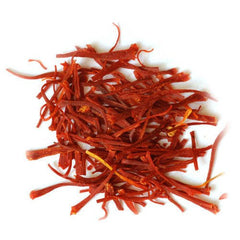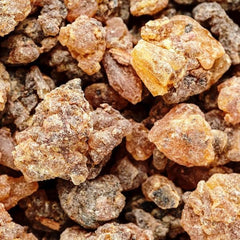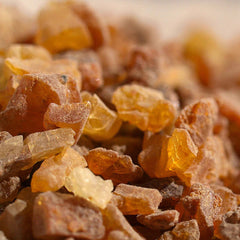What Does Calamansi Smell Like?
As An Amazon Associate We Earn From Qualifying Purchases At No Extra Cost To You

Embark on a fragrant journey to the tropics and discover the enchanting aroma of calamansi. A citrus fruit native to Southeast Asia, calamansi, also known as calamondin or Philippine lime, boasts a distinctive fragrance that captures the essence of sunny orchards. Join us as we explore the question: What does calamansi smell like?
What Does Calamansi Smell Like?
Enter the tropical world of calamansi, where the fragrance is a lively and zesty celebration of citrus. Join me on a fragrant journey to discover the captivating aroma that defines the essence of calamansi.
Citrus Radiance: A Tropical Sunrise
As you approach calamansi, the first olfactory impression is a burst of citrus radiance, reminiscent of a tropical sunrise. Picture the brightness of lemons and the tanginess of limes seamlessly combined. Calamansi's fragrance is a celebration of citrus brilliance, instantly transporting you to a sun-kissed paradise with its lively and invigorating character.
Zesty Delight: A Citrus Tango
The scent of calamansi is a delightful tango of zestiness. It captures the lively and effervescent essence of citrus, akin to a dance of citrus notes on the breeze. The aroma is a testament to the zestiness of calamansi, creating a refreshing and invigorating olfactory experience that echoes the vibrancy of tropical landscapes.
Subtle Sweetness: Tropical Citrus Harmony
While predominantly zesty, there's a subtle undercurrent of sweetness in calamansi's scent. This delicate citrus harmony adds depth to the fragrance, creating a well-balanced composition that is both lively and subtly sweet. Calamansi's aroma is a delightful interplay of zestiness and sweetness, reminiscent of tropical fruits in perfect harmony.
Juicy Vibrancy: Essence of Tropical Citrus Juices
Delve deeper into the scent, and you may notice a juicy vibrancy that characterizes calamansi's fragrance. It's as if the aroma carries the essence of freshly squeezed tropical citrus juices, creating a mouthwatering and invigorating olfactory experience.
Calamansi's Tropical Symphony
Hence, calamansi's fragrance is a tropical symphony of radiance, delight, subtle sweetness, and juicy vibrancy. It stands as a testament to the lively and vibrant qualities of this tropical citrus gem, offering a sensory experience that is both refreshing and delightful. Calamansi, with its invigorating and complex aroma, invites us to savor the tropical notes found within its peel, a fragrant journey that unfolds with every delightful whiff.
Factors Influencing the Scent of Calamansi Fragrance Oil
Calamansi fragrance oil is a carefully crafted composition designed to capture the bright and citrusy aroma of the Citrofortunella microcarpa, commonly known as calamansi or calamondin. The formulation of this fragrance involves a thoughtful combination of aromatic compounds. Here are several factors that contribute to the vibrant and zesty scent of Calamansi fragrance oil:
-
Fragrance Composition: Calamansi fragrance oil is a meticulously blended mixture of various aromatic compounds, chosen to replicate the characteristic scent of calamansi. This composition may include both synthetic and natural ingredients to achieve the desired olfactory profile.
-
Citrus Essence: At the heart of the fragrance lies the essence of calamansi. Notes of zesty citrus, with a perfect balance of sweetness and tartness, are intricately blended to mirror the refreshing and invigorating aroma of calamansi.
-
Synthetic vs. Natural Components: Calamansi fragrance oil often combines both synthetic and natural ingredients. Perfumers make choices to strike a balance between authenticity, cost considerations, and sustainability in the selection of these components.
-
Extraction Method: The method used to create Calamansi fragrance oil, whether through distillation or extraction, plays a crucial role in defining the aromatic profile. Specific extraction methods contribute to the faithful recreation of the fresh and citrusy scent.
-
Additional Citrus and Fruity Notes in the Blend: The fragrance may incorporate additional citrus elements or subtle fruity notes to enhance complexity. These complementary notes contribute to the overall vibrancy of the scent, capturing the essence of calamansi.
-
Quality of Ingredients: The quality of raw materials, including the source of essential components, directly influences the freshness and authenticity of the calamansi scent in the fragrance oil.
-
Perfumer's Artistry: The expertise and creativity of the perfumer or fragrance creator are crucial. Perfumers leverage their skills to balance different components, creating a distinctive and delightful calamansi fragrance.
-
Regulatory Compliance: Adherence to regulatory standards and restrictions on certain fragrance ingredients is crucial. Compliance with safety guidelines requires careful consideration of ingredient choices to ensure the fragrance is safe for use.
-
Usage in Products: Calamansi fragrance oil can be incorporated into various products, including perfumes, candles, room sprays, and bath products. The interaction with other ingredients in specific product formulations can influence how the calamansi scent is perceived.
-
Product Type and Concentration: The concentration of Calamansi fragrance oil in a product affects the strength and longevity of the scent. Higher concentrations may be suitable for perfumes, while lower concentrations work well for candles, soaps, or room sprays.
-
Storage Conditions: Proper storage conditions for Calamansi fragrance oil, both before and after formulation, are essential to maintain its stability and scent. Storing it in a cool, dark environment helps preserve the freshness of the fragrance.
-
Consumer Preferences and Trends: Formulations of Calamansi fragrance may adapt to changing consumer preferences and market trends. The popularity of citrus scents or unique blends may influence product formulations.
-
Artisanal vs. Commercial Production: Differences between artisanal and commercial production of Calamansi fragrance oil may impact ingredient sourcing, formulation, and overall quality. Artisanal methods may emphasize craftsmanship and unique blends.
-
Post-Formulation Processing: Additional processes, such as aging or filtering after the formulation of the fragrance oil, may influence the final scent and contribute to the desired characteristics.
Exploring different formulations of Calamansi fragrance oil allows consumers to experience a range of fresh and citrusy scents reminiscent of the delightful calamansi fruit. Individual preferences play a significant role in selecting the perfect Calamansi fragrance for various applications.
Where to Find Reputable Calamansi Fragrance Oils
-
Specialty Candle and Soap Supply Stores: Explore specialty stores dedicated to candle-making and soap supplies, as they often carry a variety of fragrance oils, including unique scents like calamansi. These stores may offer options suitable for crafting candles, soaps, and other scented products.
-
Online Fragrance Oil Retailers: Browse reputable online platforms specializing in fragrance oils. Websites and retailers dedicated to aromatherapy, candle making, or DIY crafting may have an extensive selection of calamansi fragrance oils. Check product descriptions and customer reviews for authenticity and quality.
-
Artisanal or Handmade Markets: Attend artisanal markets or craft fairs where independent sellers showcase handmade products. Artisan vendors may create unique and carefully crafted calamansi fragrance oils, providing an opportunity to explore distinct options.
-
Local Essential Oil or Perfume Shops: Specialty shops focusing on essential oils or perfumes may carry calamansi fragrance oils. These stores often prioritize high-quality scents and may offer a range of unique and citrusy aromas.
-
Online Marketplaces: Platforms like Etsy or other online marketplaces featuring handmade or artisanal products can be sources for calamansi fragrance oils. Look for sellers with positive reviews and detailed information about their products.
-
Aromatherapy Stores: Aromatherapy stores often carry a variety of fragrance oils for different applications. Inquire about the availability of calamansi scents to add a citrusy and refreshing aroma to your living space.
-
Local Farmers' Markets or Herbal Shops: Check with local farmers' markets or herbal shops that specialize in natural products. Some of these establishments may offer fragrance oils with botanical scents, including calamansi.
-
Specialty Perfume Retailers: Explore specialty perfume shops that focus on unique and exotic fragrances. These stores may carry calamansi fragrance oils known for their distinctive and bright citrus notes.
-
Word of Mouth: Seek recommendations from friends, family, or members of fragrance communities for trusted sources of calamansi fragrance oils. Personal experiences and suggestions can guide you to reputable suppliers known for quality and authenticity.
-
Check Ingredients and Descriptions: Before making a purchase, carefully read product descriptions and check ingredient lists for calamansi fragrance oils. Authentic and reputable sellers provide clear information about the composition and intended use of their products.
Note: Calamansi fragrance oils can bring a citrusy and tropical note to your DIY projects. Ensure that the fragrance oil you choose aligns with your intended use, whether it's for candles, soaps, diffusers, or other creative endeavors. Follow safety guidelines provided by the manufacturer for proper usage.
20 Questions and Answers about Calamansi:
-
Is calamansi a common note in perfumery?
- Calamansi is not as common as some other citrus notes in perfumery but is occasionally used for its unique and tropical fragrance.
-
Can calamansi be a dominant note in perfumes?
- Calamansi is often used as a bright and refreshing top note in perfumes, contributing to the initial burst of fragrance.
-
Does the scent of calamansi vary between different varieties?
- Yes, different varieties of calamansi may exhibit nuanced differences in their fragrance, influenced by factors such as ripeness and growing conditions.
-
Can calamansi be blended with other citrus notes in perfumery?
- Absolutely, calamansi harmonizes seamlessly with other citrus notes, creating a dynamic and multi-layered citrus bouquet.
-
Does calamansi's scent have invigorating properties?
- Yes, the vibrant and zesty nature of calamansi's scent is often associated with an invigorating and energizing effect.
-
Is calamansi fragrance suitable for all genders?
- Calamansi's versatile and unisex fragrance makes it appealing across genders in the world of perfumery.
-
Can calamansi be used as a single-note fragrance?
- While less common, some perfumers may appreciate calamansi as a standalone note to showcase its unique citrusy and tropical character.
-
Is calamansi used in natural perfumery?
- Yes, calamansi's natural and botanical profile aligns well with the principles of natural and organic perfumery.
-
Does the climate affect the scent of calamansi?
- Calamansi thrives in warm climates, and the intensity of its fragrance can be influenced by factors such as sunlight and temperature.
-
Can calamansi be used in scented candles?
- Yes, the bright and refreshing scent of calamansi can be infused into candles, creating an uplifting and aromatic atmosphere.
-
Are there cultural associations with the scent of calamansi?
- In many Southeast Asian cultures, calamansi is a staple ingredient, and its fragrance may evoke memories of traditional dishes and refreshing beverages.
-
Can calamansi be used in culinary perfumery?
- Absolutely, calamansi's citrusy and tropical notes make it a delightful addition to culinary creations, enhancing the overall flavor profile.
-
Does calamansi's scent change with the fruit's ripeness?
- The fragrance of calamansi can vary based on the ripeness of the fruit, with riper fruit offering a sweeter and more intense scent.
-
Is calamansi fragrance long-lasting in perfumes?
- As a top note, calamansi's fragrance may not be as long-lasting, but it contributes to the overall development of a fragrance.
-
Can calamansi be used in room sprays for its fragrance?
- Yes, calamansi's bright and refreshing scent makes it a popular choice for room sprays and air fresheners.
-
Does calamansi's fragrance have calming properties?
- While primarily known for its invigorating nature, calamansi's citrusy freshness can also provide a sense of clarity and rejuvenation.
-
Can calamansi be blended with floral notes in perfumery?
- Yes, the vibrant and tropical nature of calamansi can complement floral notes, creating a well-balanced and uplifting fragrance.
-
Are there any known allergies to the fragrance of calamansi?
- Allergic reactions to calamansi's fragrance are rare, but individuals with citrus allergies should exercise caution.
-
Can calamansi's scent be influenced by soil composition?
- The quality of the soil can impact the potency and character of calamansi's fragrance.
-
Is calamansi used in mainstream or niche perfumery?
- Calamansi is more commonly found in niche or artisanal perfumery, where its unique and tropical citrus aroma can be appreciated.
In Conclusion:
Calamansi, with its vibrant and tropical charm, invites us to savor the essence of exotic orchards. Its refreshing and invigorating fragrance, a fusion of mandarin brightness with a tropical twist, adds a touch of sunshine to the world of perfumery. So, the next time you encounter the delightful scent of calamansi, let it transport you to a tropical haven where the aroma of citrus groves dances in the warm breeze.
Buy Perfumes - Best Online Retailers
Click For Affordable Inspired Perfume Alternatives
Click For The Best Niche Perfumes & Decants
Pheromone Perfumes - Confidence, Attraction & Appeal - Click For More
Home Fragrances & Candle Warmers - Click To Scent Up Your Spaces Today!



